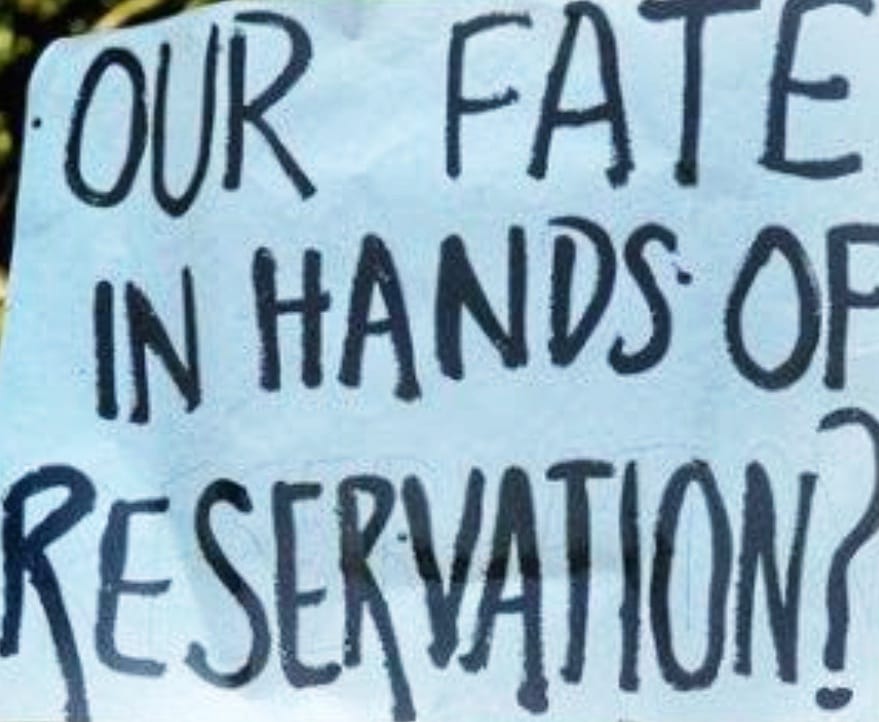
In India, reservation refers to the affirmative action policies that provide representation for historically disadvantaged groups in education and employment. The Constitution of India provides for reservation of certain positions in government jobs and educational institutions for Scheduled Castes (SC), Scheduled Tribes (ST), and Other Backward Classes (OBC). The goal of these policies is to address the historical discrimination and social and economic disadvantages faced by these groups.
Reservation policies in India have been a controversial and divisive issue. Some argue that they are necessary to address the historical and ongoing discrimination faced by these groups, while others argue that they create reverse discrimination against those who are not part of the reserved categories. The Supreme Court of India has set a maximum limit of 50% on the total number of reserved positions in order to ensure that reservation does not negatively impact the opportunities of non-reserved groups.
The Constitution of India provides for reservation of positions in government jobs and educational institutions for Scheduled Castes (SC), Scheduled Tribes (ST), and Other Backward Classes (OBC). These groups are collectively referred to as “reserved categories.”
The reservation policies are intended to address the historical discrimination and social and economic disadvantages faced by these groups. They are intended to provide them with representation in education and employment, and to ensure that they have equal opportunities to succeed.
The reservation policies apply to both central and state government jobs and educational institutions. The percentage of reserved positions varies by state and is based on the population of the reserved categories in that state.
The reservation policies have been the subject of significant controversy and debate in India. Some argue that they are necessary to address the ongoing discrimination faced by these groups, while others argue that they create reverse discrimination against those who are not part of the reserved categories.
The Supreme Court of India has set a maximum limit of 50% on the total number of reserved positions in order to ensure that reservation does not negatively impact the opportunities of non-reserved groups.
The Constitution of India provides for reservation of positions in government jobs and educational institutions for Scheduled Castes (SC), Scheduled Tribes (ST), and Other Backward Classes (OBC). These groups are collectively referred to as “reserved categories.”
The reservation policies are intended to address the historical discrimination and social and economic disadvantages faced by these groups. They are intended to provide them with representation in education and employment, and to ensure that they have equal opportunities to succeed.
The reservation policies apply to both central and state government jobs and educational institutions. The percentage of reserved positions varies by state and is based on the population of the reserved categories in that state.
The reservation policies have been the subject of significant controversy and debate in India. Some argue that they are necessary to address the ongoing discrimination faced by these groups, while others argue that they create reverse discrimination against those who are not part of the reserved categories.
The Supreme Court of India has set a maximum limit of 50% on the total number of reserved positions in order to ensure that reservation does not negatively impact the opportunities of non-reserved groups.
In addition to reservation in government jobs and educational institutions, there are also reservation policies in place for the allocation of seats in the Indian parliament and state legislatures.
The reservation policies in India have faced legal challenges, and there have been several Supreme Court cases related to reservation. In 1992, the Supreme Court upheld the constitutionality of reservation policies, but also set the 50% maximum limit on the total number of reserved positions.
In 2019, the Indian government introduced a new reservation policy for Economically Weaker Sections (EWS) in central government jobs and educational institutions. This policy provides for reservation of 10% of the total number of positions for EWS candidates.
The EWS reservation policy is intended to provide representation and opportunities for economically disadvantaged individuals who do not belong to the Scheduled Castes (SC), Scheduled Tribes (ST), or Other Backward Classes (OBC) categories. To be eligible for EWS reservation, candidates must have a family income of less than 8 lakh rupees per year and must not belong to any of the reserved categories.
The EWS reservation policy has been the subject of controversy and debate in India. Some argue that it is necessary to provide opportunities for economically disadvantaged individuals, while others argue that it could lead to further confusion and litigation.
The EWS reservation policy was introduced in 2019 by the Indian government to provide representation and opportunities for economically disadvantaged individuals who do not belong to the Scheduled Castes (SC), Scheduled Tribes (ST), or Other Backward Classes (OBC) categories.
The EWS reservation policy applies to central government jobs and educational institutions. It provides for reservation of 10% of the total number of positions for EWS candidates.
To be eligible for EWS reservation, candidates must have a family income of less than 8 lakh rupees per year and must not belong to any of the reserved categories. Candidates must also meet the other eligibility requirements for the specific job or educational institution they are applying to.
The EWS reservation policy has been the subject of controversy and debate in India. Some argue that it is necessary to provide opportunities for economically disadvantaged individuals, while others argue that it could lead to further confusion and litigation.
The EWS reservation policy has also faced legal challenges. In 2020, the Supreme Court of India upheld the constitutionality of the EWS reservation policy, but also directed the government to set up a commission to examine the feasibility and implications of extending the reservation beyond the current 10% limit.